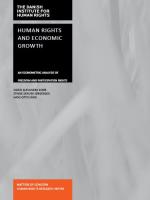
Human rights and economic growth
This report seeks to answer the question whether human rights have a positive effect on economic growth, and therefore are not only the right thing to do in normative terms but also the smart thing to do in economic terms.
The analysis is a follow-up to an earlier working paper, which explored the relationship between human rights and economic development on the basis of a literature study. This time we step beyond the literature studies and undertake an empirical, econometric analysis of how freedom and participation rights interact with economic growth using the dynamic panel data estimation method.
In the analysis we find that there is a significant causal effect from freedom and participation rights to economic growth, when accounting for the respect for these rights 10-15 years back in time. In contrast, we find no significant causal relation for the reverse directional flow, running from economic growth to freedom and participation rights.
We then estimate how freedom and participation rights affect economic growth in the long run by means of a dynamic panel data model. We find that the long-run effect of the measured rights on growth is positive and significant. This is mainly driven by the right to freedom of speech, freedom of assembly and association and electoral self-determination. Finally, we examine whether and how the same freedom and participation rights affect economic growth in various regions of the world. Here we find that the long-run effect differs across regions.
This means that the strengthening of freedom and participationrights does not represent a cost in terms of economic growth. This analysis can be seen as a stepping stone towards a greater understanding of how human rights affect our societies.
MATTERS OF CONCERN is a working paper series focusing on new and emerging research on human rights across academic disciplines. It is a means for DIHR staff, visiting fellows and external researchers to make available the preliminary results of their research, work in progress and unique research contributions. Research papers are published under the responsibility of the author alone and do not represent the official view of the Danish Institute of Human Rights.
We strive to make the pdf versions of our publications etc. accessible for screen readers. If you experience any problems, please contact Digital Editor Stine Juhl Nielsen on stni@humanrights.dk
